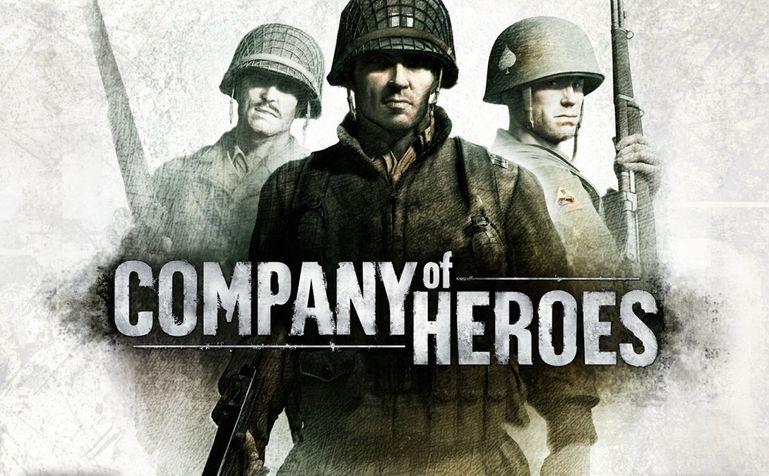Company Of Heroes
When I think about World War II, I’m struck by the thought that the romanticisation of it almost feels like something from another age. In an age where I’ve lived through multiple interminable wars, “mission accomplished” is a meme, and the very concept of war itself has become muddled and tattered to the point of near unrecognisability, there is something about WWII that seems naively romantic. It’s a war where the stakes were obvious, everyone agrees that the bad guys were bad, and the end of the war represented an actual end to the war (sort of). It’s perhaps the last war of its kind, especially in the modern age of shadow warfare, drone strikes, and “special operations.” I can understand why there’s so much nostalgia and romanticisation of it. For all the horror and violence war brings, we want to believe it’s worth it. That’s increasingly impossible in a world where it’s not clear there’s even a war in the first place.
Still, there’s also something disturbing about rehashing the same battles over and over, of sending the same units to die against the same enemies time and time again. Rather than inventing a fantasy war where no one actually had to suffer, we instead take the deaths of actual people and use it to play out our own fantasies of being generals, commanders, or super-soldiers. We ask these people who lived and died to do so over and over, and make it up to them by labelling them heroes. In romanticising WWII, the true horror of war gets glossed over, replaced by facts and figures about tanks, planes, and companies of men.
I don’t see that Company of Heroes is any different.
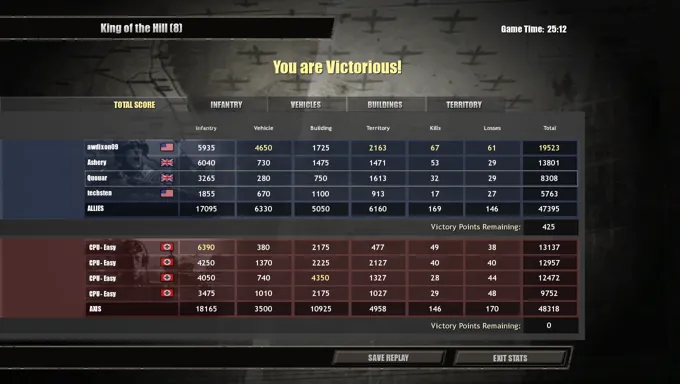 Looks like I won war, though!
Looks like I won war, though!
Company of Heroes is a WWII real-time strategy game (RTS). Players play as either the Axis or Allies, building up resources and troops, and engaging in combat in various battlefields across Europe. The single player campaign follows Able Company, a group of American soldiers fighting their way through France after the Invasion of Normandy, with the player commanding their advance through demolished French villages, their battles against Germans, and the liberation of the French countryside. Though Able Company itself does not seem to be real, the battles and events it participates in very much are, and provide a sense of drama, as well as a general sense of the importance of the battles being fought. These aren’t isolated skirmishes against one group of Germans or another. These are, instead, part of the narrative of the liberation of Europe, and the player has the honour of participating in that narrative. The game does an excellent job telling its story, even if the story is admittedly not the strongest point of the game.
In addition to its single player campaign, Company of Heroes has a robust multiplayer system with a variety of modes and teams to play as. I only played a few rounds of multiplayer, and so can’t fully comment on every multiplayer mode, but the multiplayer as a whole is fun. Like any multiplayer RTS, it tends to throw the player in and not check if they brought their water wings, but once the initial chaos is overcome, there is a lot to enjoy. I played the king of the hill mode, and enjoyed the dynamism of the environment and the battle. Battles are constantly changing and shifting, with new fronts opening and new fires to tamp down. While the AI is not stellar, it is good enough to be fun, even if not necessarily challenging.
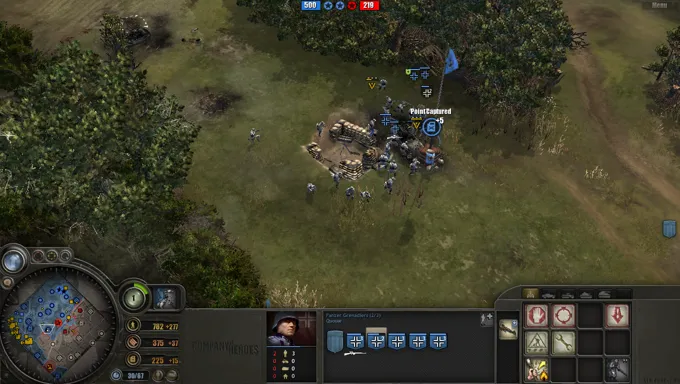 I’m winning!
I’m winning!
Company of Heroes is widely regarded as one of the best strategy games of all time, if not one of the greatest games of any kind, and justifiably so. Its gameplay provides quite a bit of depth and strategy while also being accessible. The variety of pathways players have available to customise their armies provides a wide variety of potential builds and strategies, and the dynamic map creates a constantly evolving atmosphere that forces the player to pay attention and act decisively. The maps are well-designed, modes fun, and the game is just a treat to get involved in. The campaign is compelling, and manages to strike a good balance between story and gameplay.
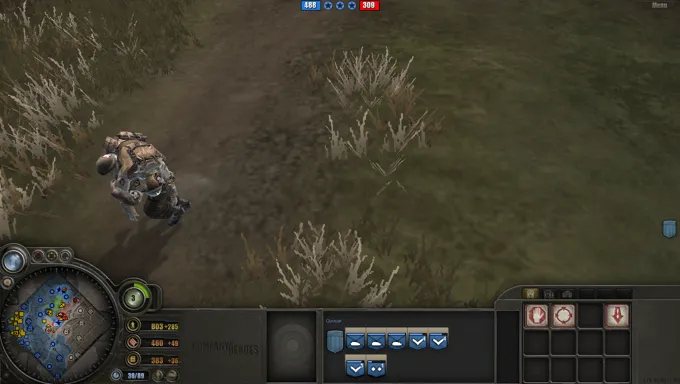 The graphics are from 2006, and I’m not going to fault it for that.
The graphics are from 2006, and I’m not going to fault it for that.
The thought I’m left with, though, is the one I explored in the introduction. As a game, Company of Heroes is excellent. If there are faults, I’m not sufficiently immersed in the world of RTSes to spot them, nor do I have any real desire to find them. What I’m left thinking about instead is why this game exists and why it tells the story that it does.
WWII is a vital point in the story of the world. It was a global conflict, and perhaps one of the last wars with true battlefields and unambiguously good and evil combatants. Across Europe, the memories of WWII are etched into the very fabric of nations themselves. On my way home every day, I pass a subway station with a large monument to the Canadian crew of an RAF plane that crashed and wasn’t found until the station was being built. The streets are paved with the names of Jewish families deported and murdered during the Holocaust, and the memory of occupation and resistance still finds its way into the monologues of politicians. My intentionally unnamed country sees its history as one existing pre- and post-war, with WWII being the point of innocence lost. It is evoked as a fundamental piece of the past, while still being part of the current and living identity. WWII and the horrors and crimes it saw committed across Europe can never be forgotten and must be perpetually remembered.
Yet at the same time, certain elements of WWII are forgotten, perhaps not intentionally, but forgotten nonetheless. Dehumanising language to describe refugees has led to a rise in bombastic right-wing politicians who see no issue with suspending the constitution if it serves their own racist ends. The lessons about fascism and its rise have by and large been forgotten, even as the narrative about WWII remains an intrinsic part of pan-European identity. What’s remembered isn’t the political lessons or the philosophical ones. What’s remembered are the companies of heroes.
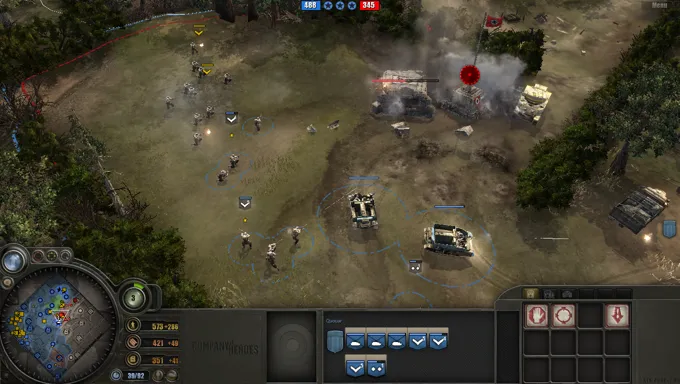 This is likely an inappropriate use of every troop involved, and I don’t care.
This is likely an inappropriate use of every troop involved, and I don’t care.
Company of Heroes is nearly twenty years old at the time of writing. It is far from the cause of a romanticisation of war, but rather, a product of it. WWII has not stopped being romanticised, even as we have more and more access to truly understand the horrors of war. When bodies go flying up or are blasted apart on Company of Heroes’ screen, or when we’re told 80% of the company dies, it’s understood that this is not a tragedy. It’s a sacrifice, and should be celebrated as such. When thinking about V-Day celebrations and Liberation Day celebrations across Europe, I think about the association of WWII and its myriad horrors with festivals, music, and delight. War is terrible, but it ends, and is fought for good reasons and to do good. Those good elements should be sacrificed, and the rest glossed over beneath a veneer of noble sacrifice.
I am writing this review as the conflict in Gaza reaches its fifth month. Images and reports from Gaza are constantly available, able to be seen by anyone who cares to look. Media reporting on both sides highlight the inhumanity, though whose inhumanity is highlighted depends on who tells the story. A former boss of mine has described Palestinians as “the worst evil the Earth has ever seen,” a sentiment echoed by some Israeli politicians. The deaths of Israeli soldiers are highlighted by Israeli media, their faces and stories told, and their deeds hailed as heroic, even as the number of Palestinian deaths ticks into the tens of thousands.
The war in Ukraine is in its second year. Russian media highlights its dead as heroes, and Ukraine does the same. Propaganda runs rampant on both sides, telling the narrative of war through the lens of sacrifice and nobility. It is a sacrifice on the part of all Russians to support the “special operation” in Ukraine. It is a sacrifice when a man leaves his family to be blown apart by a Russian tank. War ceases to be about the horror and the violence, and becomes about noble efforts and the pawns moving across the field.
Did you know there’s a civil war in Myanmar? What about Tigray? Did you know there’s been a famine in Yemen since 2016 due to its civil war, and that over a hundred thousand people have died as a result?
War is not a romantic thing, nor should it be romanticised. It is brutal and angry and harsh, and the consequences of it are borne by those in the least position to do so. We play at war while thousands die, and our play masks reality. We hear about deaths and are reminded only of the festivals that will be celebrated when the war is done. The true horror of war gets diminished more and more as we frantically romanticise that one war where the good guys were definitely good and their victory was unambiguous. The reality of war gets replaced by discussions of vehicles, terminology of tanks, and the careful mapping of which upgrades to take on human sacrifice.
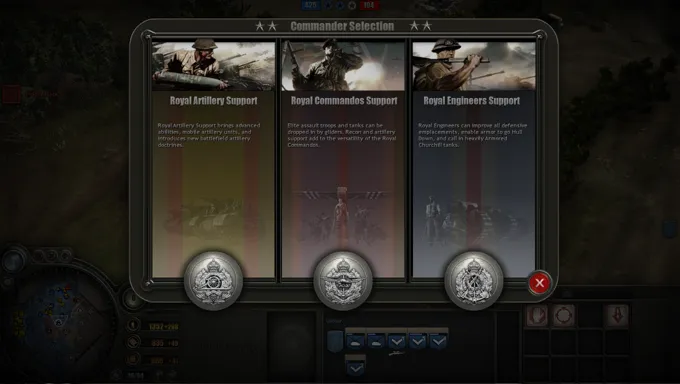 I picked artillery!
I picked artillery!
Company of Heroes is an excellent RTS. If we must play at war, it does a good job of making the strategy of that war feel meaningful and palpable.
But must we play at war?
Developer: Relic Entertainment
Genre: Real-Time Strategy
Year: 2006
Country: Canada
Language: English
Play Time: 18-20 Hours
Youtube: https://youtu.be/YNfl-d-LhDw
